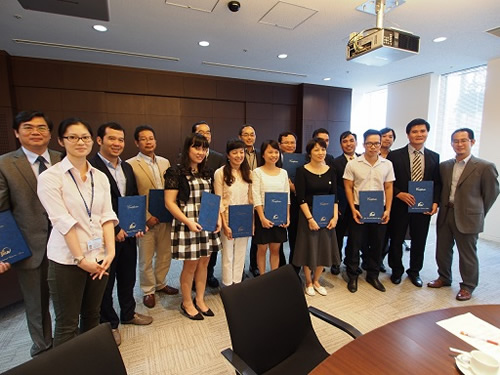- Home
- Technical Cooperation Projects
- Index of Countries
- Asia
- Viet Nam
- Project to Support the Planning and Implementation of NAMAs in a MRV Manner (SPI-NAMA)
- Project Activities
- Output 1 National Level Activities and Measures (from Year 2015 to present)
- Summary of First National Level Training Mission to Japan
Project Activities
Summary of First National Level Training Mission to Japan
The 1st national level training mission to Japan has been organized from 6th to 11th September, 2015.

The training aimed at acquainting Vietnamese participants with, and facilitating learning from Japan's experiences and lessons on both developing, implementing and tracking progress of national-level mitigation policy framework, as well as municipal-level mitigation initiatives and current practices.
The training mission was participated by 13 Vietnamese officials from various Ministries (MONRE, MPI, MOIT, MOT, MOC) as well as from municipalities (Hai Phong, Da Nang, Ho Chi Minh City), accommodating the coverage of the Project in supporting both policy development at national level and implementation at municipal level.
During the training, the participants have visited a number of key relevant organizations, including Ministries (Ministry of Environment, Ministry of Economy, Trade and Industry), business consortium (Keidanren), Tokyo Metropolis and numerous research and implementing agencies (National Institute for Environmental Studies, Overseas Environmental Cooperation Center, Institute for Global Environmental Strategies) to learn experiences and different roles played by different actors in planning, implementing and achieving target/mitigation actions. The major topics covered during the training included, inter alia;
- National-level target setting (Kyoto Protocol, Mid-term Target, INDC), process to develop target achievement plan and its implementation, lessons
- Major polies to incentivize decarbonization (carbon tax, financial support to municipalities)
- GHG Measurement, Reporting and Disclosure System under the Act on Global Warming Countermeasure Promotion
- Top Runner Program under the Energy Conservation Law
- Joint Crediting Mechanism and its current status
- Role of projection modeling in setting GHG emission reduction target
- National GHG Inventory
- Case studies for NAMA development across developing countries
- Different MRV modalities/structure according to different types of mitigation
- Measures taken by Private sector (Keidanren's Commitment to a Low Carbon Society, Voluntary Action Plan)
- Measures taken by Municipalities (Tokyo Metropolis' Carbon Reduction Reporting Program, GHG emission trading system (cap & trade))
In addition, the Training Mission has visited Roppongi Hills to learn from its state-of-the-art energy management system (EMS) for the large-scale commercial building, as well as from its vertical green city approach to realize compact city to optimize energy and spatial use.
Exposure to experiences and practical lessons throughout the training has provided food for thoughts, and also served as direct inputs to the on-going domestic policy development in Vietnam, including Roamdap and national-level MRV. The training also offered a number of opportunity for Vietnamese participants to present and discuss current status of Vientam's effort for climate mitigation, as well as space for an exchange with lecturers, which for overall contributed to enhance understanding of potential approaches for mitigation/NAMAs which could be adopted both at national and municipal level.
- About JICA
- News & Features
- Countries & Regions
- Our Work
- Thematic Issues
- Types of Assistance
- Partnerships with Other Development Partners
- Climate Change / Environmental and Social Considerations
- Evaluations
- Compliance and Anti-corruption
- Science and Technology Cooperation on Global Issues
- Research
- JICA Development Studies Program / JICA Chair
- Support for the Acceptance of Foreign HRs / Multicultural and Inclusive Community
- Publications
- Investor Relations
